Copyright: <a href='https://www.123rf.com/profile_dzejmsdin'>dzejmsdin / 123RF Stock Photo</a>
As enlightened leaders, many of us say that we want to empower our teams to bring out the best in each person working for us. Sometimes we do many of the right things: focusing on solutions, transparency, giving challenging assignments, resisting micromanagement, and listening. Yet, despite our efforts, we’re sometimes dismayed to learn that our teams don’t feel empowered.
Perhaps we can take a lesson from United Airlines. Their highly publicized fiasco last week where a passenger suffered injury being dragged off a plane was compounded by the company’s initial response, “Our employees followed established procedures for dealing with situations like this.”
Some airline veterans that I know recalled a time when passenger agents were once empowered to do what was necessary to make things right for the passenger. This common sense approach would likely have prevented an incident like this. How could last week's events have happened?
Like many organizations, someone probably made a mistake once upon a time, and the organization’s response was to pile on more procedures. Many companies have thousands of pages of policies and procedures. In fact they are so voluminous, no employee could possibly know them all.
I once worked for an organization where I was told at an exit interview, “You talk about empowerment, but there are so many rules here, I feel like I'm in handcuffs.” He went on to say how demoralizing it was to work in an environment where there was so little trust.
As I spoke to the man, who was soon to be a former employee, I saw that he was right. I realized that the procedures that we put into place created a bureaucratic maze that often defied common sense and added needless cost and frustration for our team. I never got a chance to address it because I too moved on, but last week’s events made me remember it.
Policy and procedures are important, especially when they provide for the health and safety of the public and employees. Beyond that, organizations should consider whether they’re worth the cost to their business. As a manager, I understand that it is comforting to know that your procedures cover you, but is it worth the cost of a disengaged workforce?
QUESTION: How do you determine if a procedure is really needed?
===========================================================









